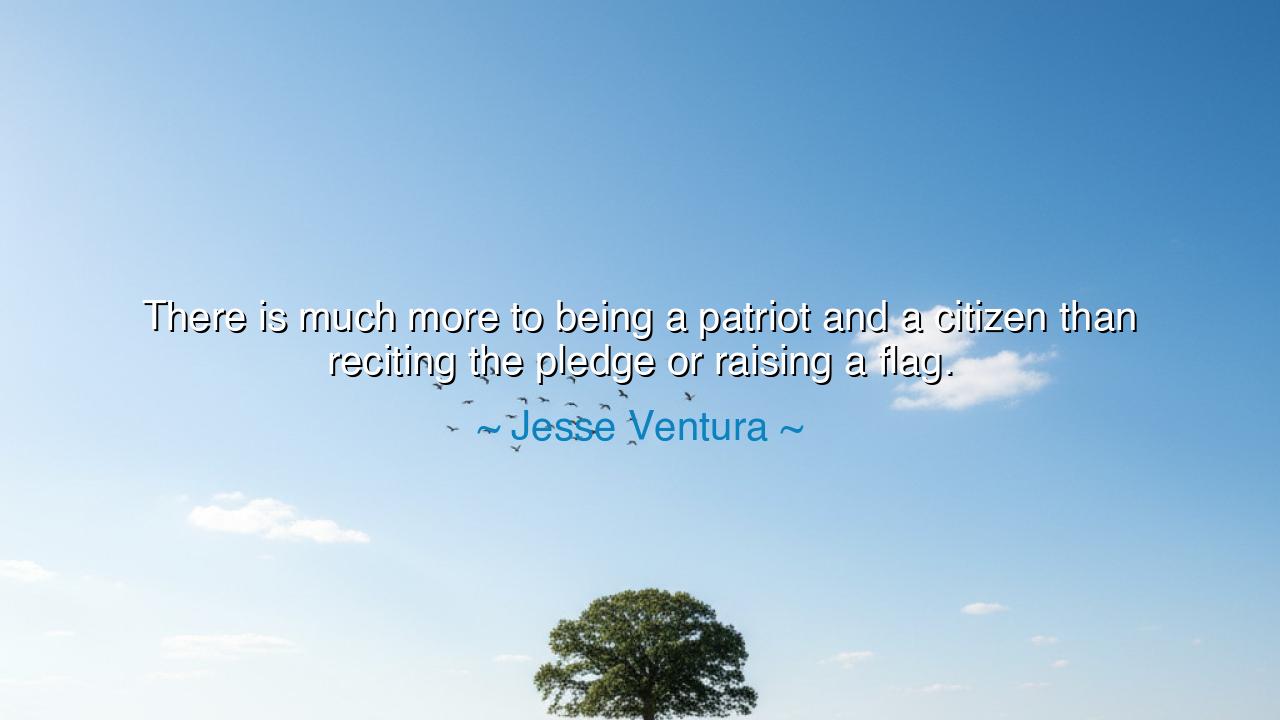
There is much more to being a patriot and a citizen than
There is much more to being a patriot and a citizen than reciting the pledge or raising a flag.






“There is much more to being a patriot and a citizen than reciting the pledge or raising a flag.” So spoke Jesse Ventura, the soldier, wrestler, and governor, a man who lived in many roles but understood one timeless truth: that patriotism is not ceremony alone, nor hollow ritual, but the living practice of responsibility. In this saying, he calls us to look beyond the symbols and words of loyalty, and to embrace the deeper, harder, nobler duties of true citizenship. For a nation is not preserved by oaths spoken, but by lives lived in service and sacrifice.
The meaning of Ventura’s words is a rebuke to complacency. It is easy to stand for a pledge, to lift a hand, to salute a flag. These acts are not wrong—they are beautiful symbols of love and reverence—but if they are all we do, then our loyalty is but a shadow. True patriotism demands more: to vote wisely, to defend justice, to aid the weak, to question corruption, to labor for the common good. To raise a flag is honorable, but to raise one’s neighbor from despair is greater still.
The origin of this insight lies in Ventura’s own experience as a Navy SEAL during the Vietnam era, and later as a public servant. He saw firsthand that loyalty is not proven in words, but in action. On the battlefield, a soldier’s love of country is tested not by reciting pledges, but by his courage, endurance, and sacrifice. In government, a leader’s patriotism is measured not by how often he waves the flag, but by how faithfully he serves his people. Ventura knew that the truest patriots were often quiet souls whose lives embodied service, though their lips rarely boasted.
History confirms this wisdom. During the civil rights movement in America, many claimed patriotism by clinging to flags and slogans, yet denied their fellow citizens equality and dignity. Meanwhile, the true patriots were those who marched, suffered, and even died for the fulfillment of the nation’s founding promise: liberty and justice for all. Their citizenship was not ceremonial, but costly, proving that real devotion often demands struggle rather than comfort.
Or think of the founding fathers themselves. They did not merely raise banners against Britain; they risked their fortunes, their reputations, their very lives to forge independence. Their patriotism was not words whispered in assembly, but deeds etched in history. They remind us, as Ventura does, that the flag must be more than fabric, and the pledge more than words. They must be lived, embodied, incarnate in the choices of every citizen.
The lesson is clear: symbols without substance are empty. Do not mistake the outward gesture for the inward devotion. Speak the pledge, yes, but let your life be its fulfillment. Raise the flag, yes, but let your actions defend what that flag represents. For the republic is not preserved by rituals alone, but by citizens who take up their responsibility with seriousness and love.
Practically, this means engaging in the hard work of democracy. Vote in every election. Hold leaders accountable. Serve your community not for glory, but for the good of others. Live honorably, so that your private deeds match the public words you speak. Teach your children that love of country is not measured by how loudly they recite the pledge, but by how faithfully they serve their neighbors.
So let Ventura’s words echo in your heart: there is much more to being a patriot and a citizen than reciting the pledge or raising a flag. Let them remind you that the true measure of loyalty is not in what you say in a moment, but in what you live across a lifetime. For the republic will stand not upon symbols alone, but upon the shoulders of citizens who embody with their lives the spirit of freedom and justice.






AAdministratorAdministrator
Welcome, honored guests. Please leave a comment, we will respond soon